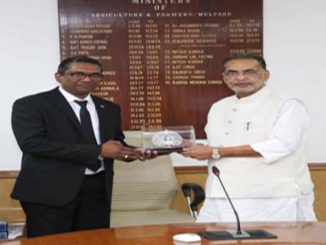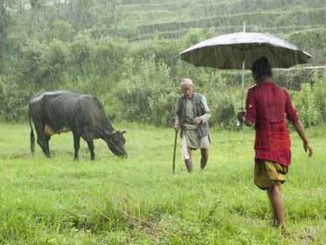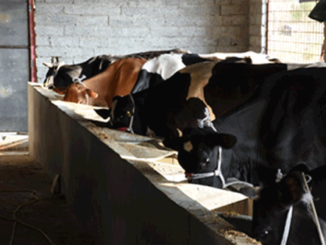Finance Minister Nirmala Sitharaman addressed the media today to announce the third tranche of the Rs. 20 lakh crore economic package earlier announced by prime minister Modi to revive the economy hit by nation-wide lockdown due to the coronavirus pandemic. Today mainly economic packages are announced related to farmers.
Union Finance & Corporate Affairs Minister in her press conference announced measures to strengthen Infrastructure Logistics, Capacity Building, Governance and Administrative Reforms for Agriculture, Fisheries and Food Processing Sectors. Here are the key highlights from Nirmala Sitharaman’s address:
Yesterday’s announcements related to farmers
Rs 30,000 crore Additional Emergency Working Capital for farmers through NABARD
- NABARD will extend additional re-finance support of Rs 30,000 crore over and above the Rs 90,000 already being provided by NABARD for meeting crop loan requirement of Rural Cooperative Banks and RRBs.
- Will benefit 3 crore farmers, mostly small and marginal
Rs 2 lakh crore credit boost to 2.5 crore farmers under Kisan Credit Card Scheme
- A special drive to provide concessional credit to PM-KISAN beneficiaries through Kisan Credit
- Fisherman and Animal Husbandry Farmers will also be included in this drive.
- Will inject additional liquidity of Rs 2 lakh crore to 2.5 crore farmers
Today’s announcements related to farmers
Agriculture : Additional Steps during COVID
- A number of measures supporting farmers was explained yesterday..
- Additional measures taken during last 2 months are below.
- During lockdown period Minimum Support Price (MSP) purchases of amount more than Rs 74,300 crores.
- PM KISAN fund Transfer of Rs 18,700 crores.
- PM Fasal Bima Yojana claim payment of Rs 6,400 crores.
Animal Husbandry: Additional Steps during COVID
- During Lockdown, Demand of Milk reduced by 20-25%.
- 560 Lakh litre per day(LLPD) procured by cooperatives against daily sale of 360 LLPD.
- Total 111 Crore Litres extra procured ensuring payment of Rs 4100 Cr.
- A new scheme to provide interest subvention @2% per annum to dairy cooperatives for 20-21.
- Additional 2% p.a interest subvention on prompt payment/interest servicing.
- This scheme will unlock 5000 Cr additional liquidity, benefitting 2 Cr farmers.
Fisheries: Additional Steps during COVID
- All 4 COVID related announcements for fisheries implemented
1. Validity of Sanitary Import Permits (SIPs) for import of Shrimp Broodstock extended by 3 months.
2. Condoned delay up to 1 month in arrival of Brood stock consignments.
3. Allowed rebooking of Quarantine cubicles for cancelled consignments with no additional charges.
4. Verification of documents and grant of NOC for Quarantine relaxed from 7 days to 3 days. - Registration of 242 Registered Shrimp hatcheries and Nauplii Rearing Hatcheries expiring on 31.03.2020 extended for 3 months.
- Operations of Marine Capture Fisheries and Aquaculture relaxed to cover Inland Fisheries.
Rs 1 lakh crore Agri Infrastructure Fund for farm-gate infrastructure for farmers
- Lack of adequate cold chain & Post Harvest Management infrastructure in the vicinity of farm-gate causing gaps in value chains.
- Focus has been on short term crop loans while investment in long term agriculture infrastructure has often not been enough.
- Financing facility of Rs. 1,00,000 crore will be provided for funding Agriculture Infrastructure Projects at farm-gate & aggregation points (Primary Agricultural Cooperative Societies, Farmers Producer Organisations, Agriculture entrepreneurs, Start- ups,)
- Impetus for development of farm-gate & aggregation point, affordable and financially viable Post Harvest Management infrastructure.
- Fund will be created immediatly.
Rs 10,000 crores scheme for Formalisation of Micro Food Enterprises (MFE)
- Scheme promotes vision of Hon. PM: ‘Vocal for Local with Global outreach’
- Unorganised MFEs units need technical upgradation to attain FSSAI food standards, build brands and marketing.
- A Scheme will be launched to help 2 lakh MFEs attain attain above goals.
- Existing micro food enterprises, Farmer Producer Organisations, Self Help Groups and Cooperatives to be supported.
- Cluster based approach (e.g. Mango in UP, Kesar in J&K, Bamboo shoots in North-East, Chilli in Andhra Pradesh, Tapioca in Tamil Nadu etc.).
- Expected outcomes: Improved health and safety standards, integration with retail markets, improved incomes.
- Will also help in reaching untapped export markets in view of improved health consciousness.
Rs 20,000 crores for Fishermen through Pradhan Mantri Matsya Sampada Yojana (PMMSY)
- Critical gaps in fisheries value chain.
- Government will launch the PMMSY for integrated, sustainable, inclusive development of marine and inland fisheries.
- Rs 11,000 Cr for activities in Marine, Inland fisheries and Aquaculture.
- 9000 Cr for Infrastructure – Fishing Harbours, Cold chain, Markets etc.
- Cage Culture, Seaweed farming, Ornamental Fisheries as well as New Fishing Vessels, Traceability, Laboratory Network etc. will be key activities.
- Provisions of Ban Period Support to fishermen (during the period fishing is not permitted), Personal & Boat Insurance.
- Will lead to Additional Fish Production of 70 lakh tonnes over 5 years.
- Employment to over 55 lakh persons; double exports to Rs 1,00,000 Cr.
- Focus on Islands, Himalayan States, North-east and Aspirational districts.
National Animal Disease Control Programme
- National Animal Disease Control Programme for Foot and Mouth Disease (FMD) and Brucellosis launched with total outlay of 13,343 crores.
- It ensures 100% vaccination of cattle, buffalo, sheep, goat and pig population (total 53 crore animals) for Foot and Mouth Disease (FMD) and for brucellosis.
- Till date, 5 crore cows & buffaloes tagged and vaccinated.
Animal Husbandry Infrastructure Development Fund – Rs. 15,000 crore
- Many areas in country with high milk production having great potential for private investment in Dairy.
- Aim to support private investment in Dairy Processing, value addition and cattle feed infrastructure.
- An Animal Husbandry Infrastructure Development Fund of Rs. 15,000 crore will be set up.
- Incentives to be given for establishing plants for export of niche products.
Promotion of Herbal Cultivation : Rs. 4000 crore
- National Medicinal Plants Board (NMPB) has supported 2.25 lac hectare area under cultivation of medicinal plants.
- 10,00,000 hectare will be covered under Herbal cultivation in next two years with outlay of Rs. 4000 crore.
- Will lead to Rs. 5,000 crores income generation for farmers.
- Network of regional Mandis for Medicinal plants.
- NMPB will bring 800 hectare area by developing a corridor of medicinal plants along the banks of Ganga.
Beekeeping initiatives –Rs 500 crores
- Beekeeping is a livelihood supporting activity for rural areas;
- Increases yield & quality of crops through pollination;
- Provides honey and other beehive products like wax.
Government will implement a scheme for:
- Infrastructure development related to Integrated Beekeeping Development Centres, Collection, Marketing and Storage Centres, Post Harvest & value Addition facilities etc.
- Implementation of standards & Developing traceability system.
- Capacity building with thrust on women.
- Development of quality nucleus stock and bee breeders.
This will lead to increase in income for 2 lakh beekeepers and quality honey to consumers.
From ‘TOP’ to TOTAL – Rs 500 crores
- Supply chains have been disrupted and farmers are not being able to sell their produce in the markets.
- Distress sale and reduction of price of perishable fruits and vegetables at the farm level needs to be prevented.
- Operation Greens will be extended from Tomatoes, Onion and Potatoes (TOP) to ALL fruits and vegetables (TOTAL).
- Scheme features will be as follows:
1. 50% subsidy on transportation from surplus to deficient markets.
2. 50% subsidy on storage, including cold storage. - Pilot for 6 months Will be expanded and extended
- Expected outcomes: Better price realisation to farmers, reduced wastages, affordability of products for consumers.
Amendments to Essential Commodities Act to enable better price realisation for farmers
- EC Act, 1955 was enacted in days of scarcity.
- Need to enable better price realisation for farmers by attracting investments and making agriculture sector competitive.
- Agriculture food stuffs including cereals, edible oils, oilseeds, pulses, onions and potato to be deregulated.
- Stock limit to be imposed under very exceptional circumstances like national calamities, famine with surge in prices.
- No such stock limit shall apply to processors or value chain participant, subject to their installed capacity or to any exporter subject to the export demand.
- Government will amend Essential Commodities Act.
Agriculture Marketing Reforms to provide marketing choices to farmers
- Farmers bound to sell agriculture produce only to Licensees in APMCs.
- Such restriction of sale is not there for any industrial produce.
- Results in Hindrances in free flow of Agricultural Produce and Fragmentation of Markets and Supply Chain.
- Less price realization for farmer.
A Central law will be formulated to provide –
- Adequate choices to farmer to sell produce at attractive price.
- Barrier free Inter-State Trade.
- Framework for e-trading of agriculture produce.
Agriculture Produce Price and Quality Assurance
- Farmers lack an enforceable standard mechanism for predictable prices of crops at the time of sowing.
- Private sector investment in provision of inputs and know how in the agriculture sector hindered.
- Facilitative legal framework will be created to enable farmers for engaging with processors, aggregators, large retailers, exporters in a fair and transparent manner.
- Risk mitigation for farmers, assured returns and quality standardisation shall form integral part of the framework.






Be the first to comment